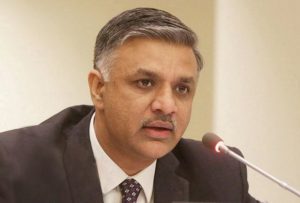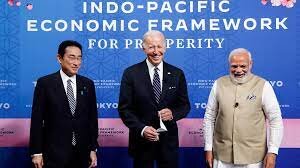
By Prof. Sachin Chaturvedi
The Indo-Pacific concept now has two pillars, security and trade / economic growth. These two pillars are providing strength in terms of how we collectively go forward. This is where the Indo Pacific Economic Framework (IPEF) comes in. The concept of IPEF came from the US. The bandwagon has all the right noises that the US would like. The six features that the US has identified are all included in IPEF.
Trade facilitation, the low hanging fruit, which was the focus of the Bali WTO ministerial, is an important dimension of IPEF. Though the fine prints are yet to be made available, it is expected to revolve around promoting digitisation of the trade process, single window for import and export, and possibly, the interoperability of national single windows. These measures can reduce the trade costs and pave the way to deeper trade integration among participating countries.
IPEF vs RCEP
There are concerns in terms of the supply chain resilience that we need in the region. Dependence on one country for supply of critical inputs has proved detrimental since the outbreak of Covid. IPEF envisages establishing an early warning system, mapping critical mineral supply chains, improving traceability in key sectors and geographical diversification to make supply chains more resilient.
This squarely addresses the huge challenge that the region is facing. That’s where, though India being out of RCEP, but being part of Quad, helps. IPEF is not only going to be advantageous to the member countries, but also to our partner countries like Indonesia, which will benefit out of the efforts that we are making for bringing resilience in the region as far as supply chains are concerned.

The third aspect is infrastructure. We are seeing the downside of the Belt and Road Initiative. It is not just about finance and the sovereign debt crisis; It, in fact, is going deeper in terms of the carbon footprint, the monopoly and inflation emanating from supply chain disruptions due to China blocking access to containers. The effort that China has made in blocking oil containers across the regions is a serious concern. We owe some arrangement to our fellow developing countries in terms of how we deal with this issue. Given the focus on building infrastructure, along with trade facilitation, IPEF can potentially be utilised to address these concerns.
Digital moves
The fourth feature of the IPEF, which the US has announced, is bringing in the idea of standards for digital economy and technology. This is extremely important, given the points that the Japanese G20 presidency introduced. The idea of standards for the digital economy revolves primarily around promoting digital trade. India has different positions on several digital issues – data for development, on how we leverage data and the cross border flow of data. But as Prime Minister Narendra Modi has been saying, we need to have deeper dialogue in terms of how we overcome these differences.
With India assuming the G20 presidency next year, it will be even more important for us to work with Quad countries to see how global consensus may emerge. In this context, the idea of India working together with Japan and the US for formulating acceptable standards for digital economy and technology is extremely important. Apart from data, the digital agenda of IPEF also involves cyber security, and cooperation on this aspect is expected to benefit all participating countries.
With Australia, a separate track for our trade agreement has already been launched. We already have some sort of trade agreement with each member of the East Asia Summit process.
Clean and Green
The fifth feature in IPEF for us to consider is about decarbonisation and clean energy. The Indian commitment on just transition, Germany’s new proposal that has come up at G7 and the proposal of a climate club are important. There is growing global consensus in terms of the need for a strategy to mitigate climate risk
. However, there are some differences on how we evolve the strategy and how we reach there. The idea of a climate club that is being discussed as part of the G7 German presidency is on the table. The US emphasis on decarbonisation and the assistance that has been given to a couple of countries for just transition is extremely important.
India has raised the issue of access to green finance. We need to bring back on the table the idea of access to finance and how we do the delicate balancing between the development space and climate change. So, a complete blackout on financing of coal is one important dimension. Which is the way we are moving towards net zero, what time do we have for transition and how countries are going to balance mitigation and development priorities are some serious concerns. These are also areas in which there are serious differences between countries. However, I’m sure at the Quad platform, the countries have endorsed the US’ idea of decarbonisation and clean energy as a broad objective.
In 2019, Modi, at the Indo Pacific Ocean Initiative, emphasised on maritime ecology and maritime resources and capacity building for resource sharing, something that has also appeared in the Quad. The fact that the US could provide scope for Quad fellowships, almost 100 of them for students to come to the United States, is important from the point of view of how we collectively make the efforts of taking that forward also through maritime domain awareness.
There is also a discussion on Disaster Risk Reduction and Management, which India is vocal on. The focus on a fair economy which emphasises prevention of money laundering and enforcing effective tax, augurs well for India. So, IPEF is bringing in the points which are important for India as well as for the region; they are important for all actors, and also for our partners.
Author Profile
- India Writes Network (www.indiawrites.org) is an emerging think tank and a media-publishing company focused on international affairs & the India Story. Centre for Global India Insights is the research arm of India Writes Network. To subscribe to India and the World, write to editor@indiawrites.org. A venture of TGII Media Private Limited, a leading media, publishing and consultancy company, IWN has carved a niche for balanced and exhaustive reporting and analysis of international affairs. Eminent personalities, politicians, diplomats, authors, strategy gurus and news-makers have contributed to India Writes Network, as also “India and the World,” a magazine focused on global affairs.
Latest entries
 DiplomacyJanuary 5, 2026India walks diplomatic tightrope over US operation in Venezuela
DiplomacyJanuary 5, 2026India walks diplomatic tightrope over US operation in Venezuela India and the WorldNovember 26, 2025G20@20: Africa’s Moment – The Once and Future World Order
India and the WorldNovember 26, 2025G20@20: Africa’s Moment – The Once and Future World Order DiplomacyOctober 4, 2025UNGA Resolution 2758 Must Not Be Distorted, One-China Principle Brooks No Challenge
DiplomacyOctober 4, 2025UNGA Resolution 2758 Must Not Be Distorted, One-China Principle Brooks No Challenge India and the WorldJuly 26, 2025MPs, diplomats laud Operation Sindoor, call for national unity to combat Pakistan-sponsored terror
India and the WorldJuly 26, 2025MPs, diplomats laud Operation Sindoor, call for national unity to combat Pakistan-sponsored terror







